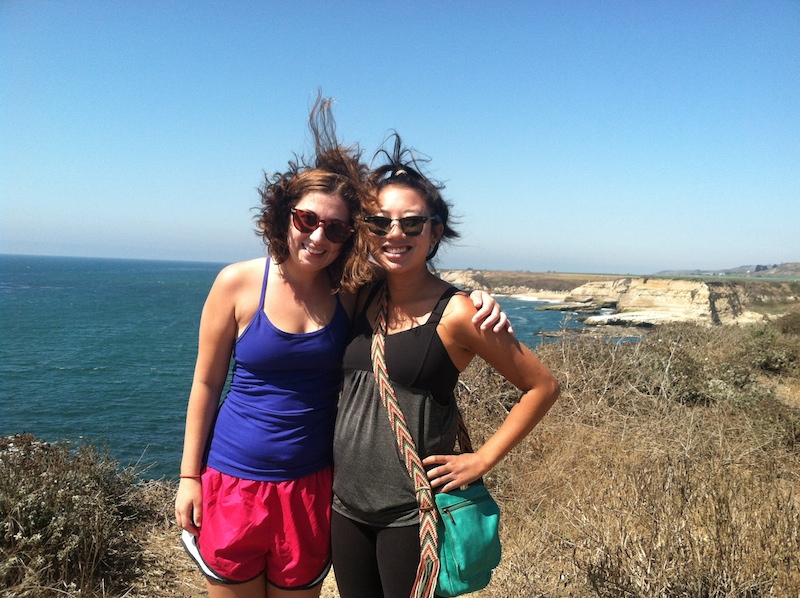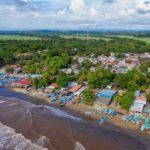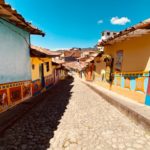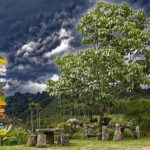Post Travel Depression: Finding My Way Home Again

I never thought that leaving would be so hard. In my last few days in Colombia, the seemingly endless bus trips and plane rides provided those boundless pockets of time, which felt like carefully crafted moments to self-reflect on my last eight months in South America. The time came and went as quickly as the changing tides.
I never thought returning to the US would be just as hard if not harder. I remember passing over Georgia, the land carved into perfectly put together rectangles and squares, and feeling the pockets of my eyes become an instantaneous bulge of tears waiting to burst. Within moments, it really hit me that South America was a blip in the road hours behind me. I was back in the US, the first world.
I was back to the hurried lifestyle that is so iconic of American people, the rush to get somewhere or become something, neglecting to stop and appreciate those small, simple, but beautiful moments that so often go unnoticed.
Atlanta reminded me of everything that I had tried to escape–security guards yelling repetitive phrases in monotone voices, as if they were under the assumption that people were robots unable to make decisions or think for themselves. I became increasingly irritated with the plethora of magazines at every shop, with their big yellow print tabloids about the most trivial headlines, while the sounds of teen pop sensation, Justin Bieber echoed through the airport walkways. And the American people seemed so unconcerned for their immediate surroundings, each individual so engrossed in their iPhone bubbles, as if they were oblivious to the existence of others.
Most noticeable was the chaos. I was back to the hurried lifestyle that is so iconic of American people, the rush to get somewhere or become something, neglecting to stop and appreciate those small, simple, but beautiful moments that so often go unnoticed. I had barely been in the US for a few hours and I was craving those honest, authentic, genuine human connections that seemed to plague every street, corner and space in South America.
Let me digress briefly and say that the efficiency of passing through immigration felt like winning the lottery, a process that would normally take half a day in South America. But, as I sat at the gate gazing out pensively at all the people, young and old, headphones in, yammering away on their phones, I realized that I was about to go back to being one of them, about to fill that open space, that missing piece in an infinite line of homogeneous average, able bodies. It was an unfortunate, depressing thought.
In that moment I began to question my idea of home. Where was my home? What is home? Am I home? The question of home would grow to become a larger more, obtrusive issue in my mind and life, as I began the more commonly coined term, the “Reentry process,” or reverse culture shock.
If you ever decide to take an extended trip outside of the country, make sure to give yourself time to readjust.
I missed the melodic, sweet sound of Spanish. On my flight to California, I had unconsciously ordered my drink in Spanish only to get a puzzled look from the neighboring passenger, and flight attendant. It would become my mission for the next month to find Colombian groups and speak Spanish with whomever gave off the slightest hint of a Latin vibe. Upon seeing my parents, I just felt confused. Part of me felt excited to see them and part of me wanted to turn around back up the escalators and hop on a plane back to Colombia that second.
If you ever decide to take an extended trip outside of the country, make sure to give yourself time to readjust. Trying to jump into my Climate Corps orientation three days after returning home was a big mistake. I was frustrated that I flew all the way back, leaving my job in Colombia in a somewhat state of disarray, abandoning my students with no English teacher to attend an orientation that I was told was mandatory. Well, if it had been mandatory, then everyone would have been there. It just made me feel like my excuse that I was in a country in the Southern Hemisphere was not extenuating or good enough. All I can say is, all those absent people better have had more compelling reasons than mine.
My building resentment, and the endless discussions of solar panels, adaptation versus mitigation and expanding public transit, were so clearly very privileged topics of discussion in my mind, that it made it difficult for me to muster even the slightest bit of concern, when truthfully I had worked in communities where children were just struggling to survive.
On my first day of work, I was sitting on the bus and all I could think of was how much I missed the chaos of Latin American transportation. As I sat surrounded by people with boredom plastered onto their faces, I closed my eyes imagining the loud cumbia music drowning out the cacophony of Spanish conversations, the gaudy tassels, stuffed animals and Jesus images that cluttered the dashboards of every colectivo, trufi, and micro. It took great effort not to scream out, “en la esquina” at the top of my lungs. I had forgotten that public transport has designated stops here.
Looking out the window, buildings of big tech companies such as Adobe and other major corporations like Ernst and Young, and Google, were as ubiquitous as the empanda and areipa stands that lined the streets of Villavicencio. Before leaving for South America, Silicon Valley was never a place I could imagine myself working or living, but now after returning, it seemed even less so.
I would wake up to the sad reality of being back in the US, then psych myself up to be excited about this new chapter in my life and the great opportunities of the Bay Area and then at the end at the day find myself spiraling downward, feeling lost, and lonely, my vision blurred by the perpetual streams of tears spilling down my face.
I couldn’t find housing. On my modest stipend and given the “booming” mentality of Silicon Valley, finding the right place with my budget was about as successful as searching for a needle in a haystack. I won’t go into the details here but maybe I will write a separate blog post about finding housing on Craigslist, including the many personalities of Craiglist. Needless to say finding housing in the Bay Area is a challenge and adventure in and of itself.
Every day is an emotional rollercoaster, with a maximum high and minimum low. The unpredictability of my emotions is exhausting and draining. I would wake up to the sad reality of being back in the US, then psych myself up to be excited about this new chapter in my life and the great opportunities of the Bay Area and then at the end at the day find myself spiraling downward, feeling lost, and lonely, my vision blurred by the perpetual streams of tears spilling down my face. I started to feel dependent, calling friends and parents incessantly, my independent, autonomous and self-reliant persona, a thing of the past. All I could think of was when and how I would get back to Colombia.
At this point when I was moving from bnb to bnb, spending my stipend in a matter of weeks on just housing alone, with most of my motivation caught in the weeds of depression. I knew it was time to take a step back, and put on the brakes. So I went back to Davis. Back in my old room, feelings from before I left South America began to resurface.
I hated my life before Bolivia, spending everyday at home wondering what I was doing with my life, if I would ever find a job and if my education was all a big, cruel joke. I felt the beginnings of my 20s pass through the spaces between my fingers. It was a difficult and frustrating few weeks for my family, employers and friends to watch me pathetically struggle through this. During this time they were either trying to better understand the reentry process or disregarding it. A sort of side note: while I understand, reentry or reverse culture shock happens to a small select group of people, it is something to be recognized and understood especially by employers as our society and world becomes more globalized and connected.
I forgot I had friends before I left for South America. It was nice to reconnect with past friends. As cliché as this may sound, as I was driving back, with the faint sound of the motor buzzing in the background, I had some time to think about friendships. I came to this conclusion: friendships are like waves; there are moments when your friends seem very close and connected and times where they seem far and distant, but they are always there. It was exciting to see how my friends had changed, how they’d grown and moved on with their lives.
Eventually, I found housing in Palo Alto that was close to friends and family and was in a neighborhood with a small town feel. It was a good place for me to be at that stage in my life. I was also back at work at the Green Ninja Project, which is an incredible environmental education NGO doing some truly amazing, inspiring work.
A lot of people say change is good, and maybe it is. All I can say is change can be hard. During those past eight months in South America, I had experienced a lot of self-actualization, and I had changed a lot. Today, I feel like this bizarre hybrid between the person I currently am and the person I was eight months ago. I guess I am just trying to figure out where I belong, and how I fit in here.
What is home? I think it’s not just about place, it’s the people but also the feelings and emotions that are associated with those people and that place. Right now I am just figuring out how to re-cultivate those feelings, and try to integrate the changes I have undergone so that home can be here.








